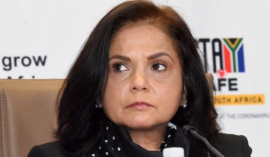
National Director of Public Prosecutions (NDPP) Advocate, Shamila Batohi, says the "very different" acts and legal mandates, which govern law enforcement agencies, are a boon in the ongoing fight against corruption and lawlessness.
The NDPP was speaking during an appearance of the NPA at Parliament’s Standing Committee on Public Accounts (SCOPA) this week.
The prosecuting authority was presenting work it has done in relation to referrals made to it by the Special Investigating Unit (SIU).
“The SIU is governed by the SIU Act and is mandated to investigate maladministration in state institutions and municipalities. So its mandate is to provide investigations primarily for the purposes of civil recovery.
“So the police and the NPA are mandated to conduct criminal prosecutions and there’s a big difference between investigations that are civil in nature and investigations that are criminal in nature. It is an important difference to understand and the fact that the burden of proof in civil investigations is on a balance of probabilities. However, the burden of proof on the NPA in criminal investigations is beyond a reasonable doubt which is a much higher standard of proof,” she said.
Batohi said despite these differences, collaboration between law enforcement agencies is critical in the fight against corruption.
“It’s really important that we work together. The public needs to understand our various roles and we should not allow any kinds of false narratives in the media that pegs us against each other. But we really need to highlight the unique and important contributions that each of us makes in this important fight,” she said.
SIU referrals
Legally, the SIU is compelled to refer all criminal matters to the prosecuting authority because the SIU's mandate stops short of giving the unit powers to conduct criminal investigations.
However, case dockets can only be registered when a criminal offence is identified through investigation, a suspect is linked to the offence and police investigations have yielded enough evidence for the NPA to provide in court.
Furthermore, referrals are often forwarded from the NPA straight to the South African Police Services’ (SAPS) Directorate for Priority Crime Investigation (the Hawks) for further investigations.
As reported earlier this week by SAnews, Batohi told SCOPA that the SIU’s referrals to the NPA “create the impression” that those matters are ready to be brought to court.
However, as explained by her deputy Advocate Rodney de Kock, these matters require further “investigative aspects” to be covered beyond the work done by the SIU.
“Further to statements that the SIU may have obtained in a particular matter, additional evidence has to be obtained by the Directorate for Priority Crime Investigation or the SAPS for court readiness. Examples of this would include forensic audit reports and often, this is a very complicated, involved process both in terms of getting authorisations for the appointment of forensic auditors.
“Furthermore, the SIU mostly cover legislative contraventions and not offences such as money laundering, fraud and theft. And to the extent that a report may highlight these aspects, those matters need to be investigated afresh from a criminal point of view,” he said.
De Kock explained that when the SIU sends a referral to the NPA, it also goes through a thorough defined processes within the authority.
“[This] report is forwarded to a relevant director of public prosecutions who has the authority to prosecute in a particular division of the country. The director of public prosecutions refers this to the relevant special commercial crimes unit (SCCU) in the division and to the Asset Forfeiture Unit in the division. The SCCU regional head allocates a prosecutor to the matter and the DPCI registers the case docket and allocates an investigating officer.
“There’s a consultative process that happens between the prosecutor and the investigator and of course the SIU investigators are also consulted and as far as possible, are brought on board,” he said.
The Deputy National Director suggested that a possible remedy to this is to have the authority involved “much earlier” in the SIU’s investigations.
“The NPA needs to be involved much earlier…so that we don’t have a scenario where the SIU investigates for six months and then submits a report to the NPA.
He said that is one of the key issues addressed in a proposed Memorandum of Understanding (MOU) between the NPA, the SIU, the Hawks and the SAPS.
“The status of that MOU is that the South African Police Services – through the National Commissioner – has requested time to consult fully with the DPCI in terms of their roles and mandates and that process has not been finalised.
“But this is ongoing on an urgent basis because we believe that once we have settled the MOU, that this will inform a better, enhanced working methodology between ourselves and all the other role players and the critical agencies,” De Kock said.
Batohi emphasised the importance of working together.
“It’s really important that we work together. The public needs to understand our various roles and we should not allow any kinds of false narratives in the media that pegs us against each other. But we really need to highlight the unique and important contributions that each of us makes in this important fight,” she said. – SAnews.gov.za


